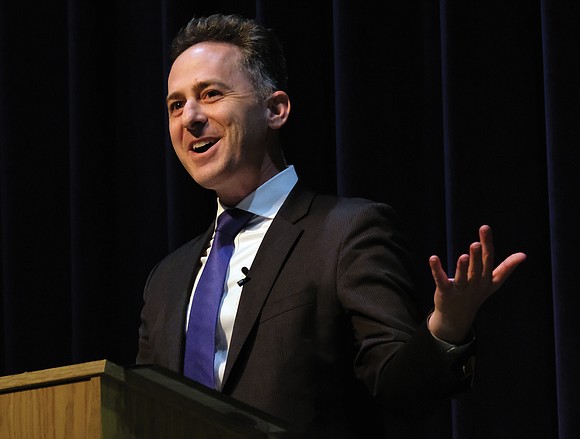School Board sends $436M budget to Mayor Stoney
Ronald E. Carrington | 2/28/2020, 6 a.m.
Richmond Public Schools is calling on City Hall and taxpayers to boost spending on public education by $21 million during the next school year in a bid to advance its strategic plan for educational improvement.
Incorporating a 4 percent increase in pay for teachers and other staff, the RPS request for an increase in the city’s contribution would represent a 12 percent jump on the record $175 million city contribution being provided this year.
In a 6-1 vote with two abstentions, the Richmond School Board on Monday issued the call in approving a record $436 million spending plan to fund instruction and other operations in the 2020-21 fiscal year beginning July 1. That total does not include any of the city funds to build, renovate or maintain public school buildings.
The vote sent the proposed “needs” budget to Mayor Levar M. Stoney and his administration to consider for inclusion in the budget plan for 2020-21 that he will present to Richmond City Council on Friday, March 6.
Under the RPS plan, the city’s contribution would rise to $196 million in fiscal 2020-21. That would add to the state’s contribution that is expected to jump $17 million to around $152 million in total support and the nearly $90 million the school system receives from grants and federal contributions.
If the School Board request is approved by the mayor and City Council, per pupil spending would rise from the current $16,600 per student to around $18,200 per student, an increase of $1,600 per student.
Board Chairwoman Linda Owen, 9th District, led the majority in approving most of Superintendent Jason Kamras’ budget recommendations to the mayor’s office. The board will approve its actual budget for the next fiscal year in June, after City Council deals with the mayor’s proposed spending plan and provides the actual figures on the city’s contribution.
During budget season last year, the council agreed with the mayor and provided an $18.5 million increase in city spending for the operations of public education — the biggest single rise in city support in at least two decades. That was also a 12 percent increase. The school system also received a separate $19 million to pay for maintenance of existing buildings.
Board members Kenya Gibson, 3rd District, and Dr. Patrick Sapini, 5th District, abstained and Jonathan Young, 4th District, voted against the latest budget proposal.
The approved RPS plan included a $4 million increase from the initial budget Mr. Kamras presented to the board on Jan. 21. The additional money resulted from the inclusion of a larger proposed pay raise for teachers. Mr. Kamras initially proposed a 3 percent pay hike.
Mr. Young opposed the budget plan because he wanted deeper cuts in central office positions. In the 2019 budget planning, he led the board in making such cuts, and he sees the new plan reversing that action.
“I am disappointed in a plan that reverses last year’s good budget work regarding the cuts to the central office,” Mr. Young said. “That was a step in the right direction toward fixing our buildings in lieu of increasing positions Downtown.”
Ms. Gibson and Dr. Sapini could not bring themselves to vote for a spending plan they believe was unsupported by specific and adequate information on the way money would be spent on pilot projects and support positions for the second phase of the Dreams4RPS strategic plan.
“Questions seeking detailed information on the need for more teachers and bus drivers and on vacancies have gone unanswered. Or when they are answered, they are somewhat late,” Dr. Sapini. “That data, which we need to review, would help us make the right decision on budget matters.”
Dawn Page, 8th District, a School Board member since 2009 and the former chair, reminded the board that the state and city have not adequately funded the district for more than a decade.
“Right now, we are playing catch-up,” Ms. Page said. “We need far more dollars for resources for art, music and athletic equipment, as well as for more nurses, specialty programs and routes for transportation.
“If we want equity, we need to institute more Advanced Place- ment courses because we have to create learning environments so our students can compete,” she said.
To drive the point home, board member James “Scott” Barlow, 2nd District, emphasized the fact that “our job as a School Board is to advocate for the district and for the resources all of our students need.”
“Our funding needs far exceed what is reasonable to expect from the city and state this year,” he continued. “We have the obligation to request funds for all of the resources the district needs so we can set a starting place so advocates can help us out in getting additional funds.”
Anticipating that RPS might not receive the full amount it is requesting from the city, Mr. Barlow urged his colleagues to start ranking the school system’s needs. He said that the board needs to be prepared to make cuts if City Council does not provide full funding.







